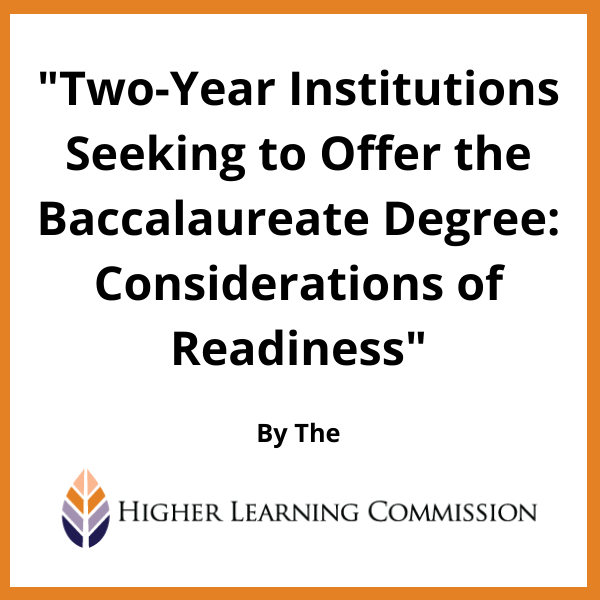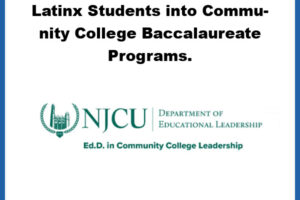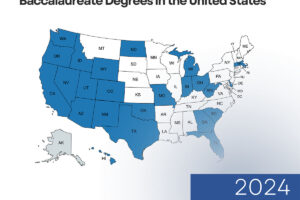Two-Year Institutions Seeking to Offer the Baccalaureate Degree | From The Higher Learning Commission, 2020
Eric V. Martin
Executive Vice President
Two-Year Institutions Seeking to Offer the Baccalaureate Degree: Considerations of Readiness
Introduction Although four-year colleges and universities have often partnered with community colleges to offer articulated baccalaureate degrees at community college locations, a growing national trend finds the two-year institutions themselves offering baccalaureate degrees. Such requests are originating increasingly within the Higher Learning Commission’s (HLC’s) region in response to various political factors, economic issues, and local workforce needs. Few associated with higher education dispute that this trend requires quality review and assurance, and it is incumbent upon HLC to review all such proposals through its policies and procedures for substantive change. Two-year institutions seeking to offer baccalaureate degree programs must have HLC approval before launching such programs. Information related to substantive change and the New Programs application can be found at https://www.hlcommission.org/academic-programs.
HLC recommends that prior to submitting a formal change application, the two-year institution ascertain for itself its readiness to offer baccalaureate degrees. This document is intended to assist these institutions in their internal review of readiness for baccalaureate programming. It also serves as a resource for peer reviewers who may be asked to evaluate such change requests. Relevant sections of HLC’s New Programs application are referenced where applicable.
INSTITUTIONAL CULTURE AND HISTORY WITH CHANGE
For most two-year institutions, movement into baccalaureate programming begins with a single academic degree program to serve a particular local need. Institutions that have experience with adding courses and programs at new levels can draw from these past occasions when considering the addition of new programs. Whereas most two-year institutions are versed at adding new associate’s level programs in accordance with their missions, few have adequate depth of experience when initiating baccalaureate degrees. Thus, it is vital that the institution consider the effects that such additions will have on faculty and staff members, students, and the delivery of other programs on campus. In reviewing such requests, HLC will consider carefully the institution’s history with change, the depth to which the institution has gone in preparing for the addition of baccalaureate programs, and the extent to which the proposed change will affect existing programs. Issues identified during prior HLC reviews will also be analyzed carefully in relation to the proposed change.
Quality Assurance MISSION (CRITERION 1)
(See also Section C. Institutional Planning for Program Change in the New Programs application.)
It is important for the institution to consider its current mission, how widely the mission is understood and accepted, and possible changes to the mission that the addition of one or more baccalaureate programs may necessitate. It is particularly important for the institution to consider its rationale for expanding its mission and to determine whether these factors are short- or longterm reasons for change. As noted above, factors may include statewide educational reform initiatives, workforce development, unemployment rates, entrepreneurial opportunities, demographic shifts, population stability, demands for enhanced employee skills, and others. Likewise, the institution should review the procedures and timeline that may be necessary to revise its mission, receive the requisite internal and external approvals and affirmations, and develop a plan to assess mission effectiveness over time.
INTEGRITY: ETHICAL AND RESPONSIBLE CONDUCT (CRITERION 2)
(See also Section A. Characteristics of the Change Requested and Section C. Institutional Planning for Program Change in the New Programs application.)
An institution’s consideration of integrity should begin with a review of any challenges identified as part of or subsequent to HLC’s last comprehensive review. It is especially important for the institution to review how these challenges were addressed as well as how they may affect proposals for baccalaureate programs. Additional considerations related to institutional integrity include:
• The proposed program’s compliance with requirements of other agencies such as state education agencies and, where applicable, program accreditors. These approvals are necessary prior to HLC review.
• Evidence of a widely shared understanding among stakeholders of the proposed program’s purpose and scope. For instance, how will the proposed baccalaureate be received by employers? Is it required for entry-level positions? At the same time, will it enable graduates to gain admission into masters programs? Will it offer a broadbased liberal education? And will it promote lifelong learning? (Responses to these questions will vary depending on whether the proposed baccalaureate will have an applied focus or a more traditional liberal arts focus.)
• Planning to ensure that accurate information regarding the program is presented to prospective students, the internal institutional community, the general public, prospective employers, and other interested parties.
INSTITUTIONAL EFFECTIVENESS, RESOURCES AND PLANNING (CRITERION 5)
(See also Section C. Institutional Planning for Program Change and Section E. Institutional Staffing, Faculty, and Student Support in the New Programs application.)
During the earliest planning stages for offering baccalaureate degrees, the two-year institution will need to review its capacity for such expansion in terms of fiscal and human resources as well as facilities requirements. Evidence should exist of adequate planning and resource allocation for the new program. Minimally relevant documentation will include:
• Evidence that the proposed program is the result of ongoing institutional planning activities to include a needs assessment and cost-benefit analysis. • Analysis of the existing market for the proposed program and competition within the service region.
• The program’s projected budget, including estimated revenues and expenses associated with the program.
• The program’s projected facility and equipment costs, including estimated licensing and maintenance costs, if applicable.
• The effect of the proposed program on existing programs in terms of finances, enrollment, and staffing.
• The institution’s recent audit reports with commentary.
• The institution’s exit strategy in the event the new degree program is not competitive.
It is also important that the institution consider carefully the number and types of faculty (fulltime, part-time, adjunct) who will be employed in the new program. As mentioned previously, these considerations should focus upon the extent to which the new degree will affect the workload of existing faculty. That is, how will teaching loads be adjusted? To what degree will faculty overload occur in order to offer the new program? And will there be sufficient full-time faculty to support the new program’s governance needs?
A related staffing consideration is the necessary qualifications for faculty because credential variations often exist between faculty at the baccalaureate level as opposed to the associate’s degree level as well as faculty in applied science programs and faculty in associate of arts and associate of science programs. The institution should anticipate that a future peer review team will examine faculty credentials carefully with the addition of a baccalaureate program.
Often this transition is made without prior consideration of fundamental questions surrounding the institution’s culture. Some institutions have observed a divided faculty where once uniform teaching loads consequently varied due to the necessity of increased scholarly engagement among the faculty teaching in a baccalaureate program. In addition to the increased demand for scholarship, baccalaureate faculty often face increased challenges related to programmatic accreditations and licensure requirements that may not have existed previously. The hiring practices and subsequent work completed to address these new challenges can deepen emerging faculty divisions. Wider variations in the allocation of faculty time as well as uneven systems for faculty recognition and reward can create further tension. In the absence of careful planning for these changes, faculty divisions can emerge and formerly unified faculty cultures can divide.
Other essential planning considerations center on student support areas such as the availability of academic and career advising, financial aid assistance, sufficient library holdings, and the availability of relevant technology to support student success. These and related support functions should not be viewed merely as add-ons to existing associate’s degree programs, but instead should receive significant consideration for retaining and graduating baccalaureate students.
TEACHING AND LEARNING (CRITERIA 3 AND 4)
(See also Section D. Curriculum and Instructional Design, Section E. Institutional Staffing, Faculty, and Student Support, and Section F. Evaluation in the New Programs application.)
In the area of academic quality, institutional considerations consist minimally of the following:
• Admission requirements and timelines for the full range of students admitted to the institution.
• A listing of all courses, including credit hours and course descriptions.
• A listing of prerequisite requirements, including courses and relevant competencies.
• A description of any special program delivery considerations such as credit for prior learning, compressed time frames, online delivery, or any other means of delivery.
• The acceptance of transfer credit or participation in articulation agreements.
• The requirements and standard timeline for graduation.
When contemplating the addition of baccalaureate degrees at a two-year institution, consideration must be given to how the proposed baccalaureate degree will be distinguished from an associate’s degree relative to knowledge and skills in the major.
The institution will need to delineate its goals for student learning in the new baccalaureate program along with the processes by which learning will be assessed. The institution’s articulation of the learning goals between the existing associate’s program and the proposed baccalaureate program will be reviewed, as will the institution’s proposed system wherein assessment data for the new program are analyzed and then utilized for improvement.
The institution will need to consider systems for supporting students at the baccalaureate level who may have deficiencies that require remediation. These systems must be congruent with existing systems yet of sufficient scope and availability to address the students’ needs as well as institutional and programmatic goals for persistence and completion.
The institution must include evidence regarding the learning resources and facilities necessary for student success. Students must have access to faculty and both faculty members and students must have access to the physical and electronic resources they need. These same requirements exist already at two-year institutions, yet a simple augmentation of existing structures and systems may be insufficient to meet the needs of baccalaureate programs. Institutions are therefore encouraged to think carefully about the full scope of expanded activities pursued in support of the new baccalaureate program.
The institution must consider both its general education and program review processes. An institution’s general education program defines what it means to be an educated person and it helps students to develop their own values and to appreciate better the values of others. General education also assists students in developing competencies in the areas of communication, critical thinking, problem-solving, qualitative and quantitative reasoning, research, and information literacy. An institution must clearly and publicly articulate its philosophy, purposes, and goals for general education and ensure that its program of general education aligns with its mission and degree levels. An institution that seeks to expand its curriculum to offer baccalaureate degrees should consider:
• The institution’s current philosophy and conceptualization of general education.
• The institution’s revised/expanded philosophy and conceptualization of general education with the addition of a baccalaureate degree.
• The expansion of student learning and articulation of any new outcomes for general education with those of the baccalaureate major.
A final area for institutional consideration centers on the ways in which program substance and rigor will be maintained over time. Here, planning should be devoted to the process and timeline for program review and evaluation of program effectiveness. As with all academic programs, data will need to be collected and analyzed to improve the curriculum, student services, and overall program operations. The institution will likely have such systems in operation at the point of adding baccalaureate degrees, but it is necessary to consider how these systems should be expanded or modified to address the information and reporting needs of the new baccalaureate programs.
Consideration should also be given to the ways in which stakeholder response to the new programs will be obtained and utilized for program improvement. Alumni and employer critique will prove particularly important in instances where associates degrees are expanded into baccalaureate degree programs. Following the initiation of the new baccalaureate program, the institution should review program data carefully and honestly, particularly with regard to questions of program expansion or possible discontinuation. If a baccalaureate program is discontinued, the institution will need to delineate for HLC the steps and timeline for teaching-out any enrolled students. HLC recommends that such exit planning occur in conjunction with plans for initiation. This preliminary planning is important in instances where the new baccalaureate programs will be offered at other locations away from the college’s main campus.
When Requests to Offer Baccalaureate Degrees are Reviewed
Evaluation of two-year institutions seeking to offer baccalaureate degrees will occur as part of HLC’s substantive change process for new programs. The average timeframe for change review is between three to eight months.
This document has reviewed a number of considerations for two-year institutions that are contemplating expansion to baccalaureate offerings. It is designed to stimulate thinking and planning on individual campuses prior to formal submission of a change request. Due to the complexity of such changes and the wide variability among two-year institutions that pursue baccalaureate programming, institutions are encouraged to contact their HLC staff liaison for further information and guidance.




